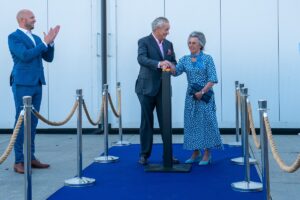Damen Maaskant celebrates new yard hall opening

A new yard hall will provide the specialised builder of fishing vessels the chance to expand operations and perform high quality refits in optimal conditions. The new Damen Maaskant logo is displayed in giant lettering on the side of the hall.
“In these troubling times for North Sea fishery, I do hope that this new hall will enable Damen Maaskant to improve on providing excellent services to their clients and that it may open the way to attracting new clients in other maritime markets”, Damen Shipyards Group chairman Kommer Damen said in his festive speech at the hall opening on 3 September. Together with Rietje Maaskant, he officially opened the new yard hall. The integration of the two companies, both with a long history and tradition, is being emphasised in the new business name.

From left to right: Damen Maaskant yard managing director Eric Moerkerk, Damen Shipyards Group chairman Kommer Damen, Mrs Rietje Maaskant
The hall at the yard in Stellendam, a harbour town at the river delta along the southern North Sea coast of the Netherlands, is 70 metres long and 20 metres wide, allowing ships of up to 18 metres high to be rolled in. An overhead crane can pick equipment from the vessel or put new items in place for installation. Dust extraction provides clean air for workers as well as good conditions for paint jobs. Wall panels have the highest possible insulation grade for this kind of building, making the hall energy efficient. This is further improved by the use of infrared heating.
Damen Shipyards Group acquired Maaskant Shipyards Stellendam in 1984. The yard had already built a strong reputation as quality builder of fishing vessels. The company name, originating from the ship builder that founded the yard in 1948, was still used, while the yard was already under Damen ownership.
The group designs and constructs vessels in a wide range of maritime markets, applying standardised design and modular components. New technologies like electric or hybrid propulsion, alternative fuels, energy saving power lay-out on board and emission gas aftertreatment have been developed, for Damen Maaskant to apply as part of the group. The new technology is needed to guide the North Sea fishery vessel fleet through the necessary transition towards zero emission fishing operations.

